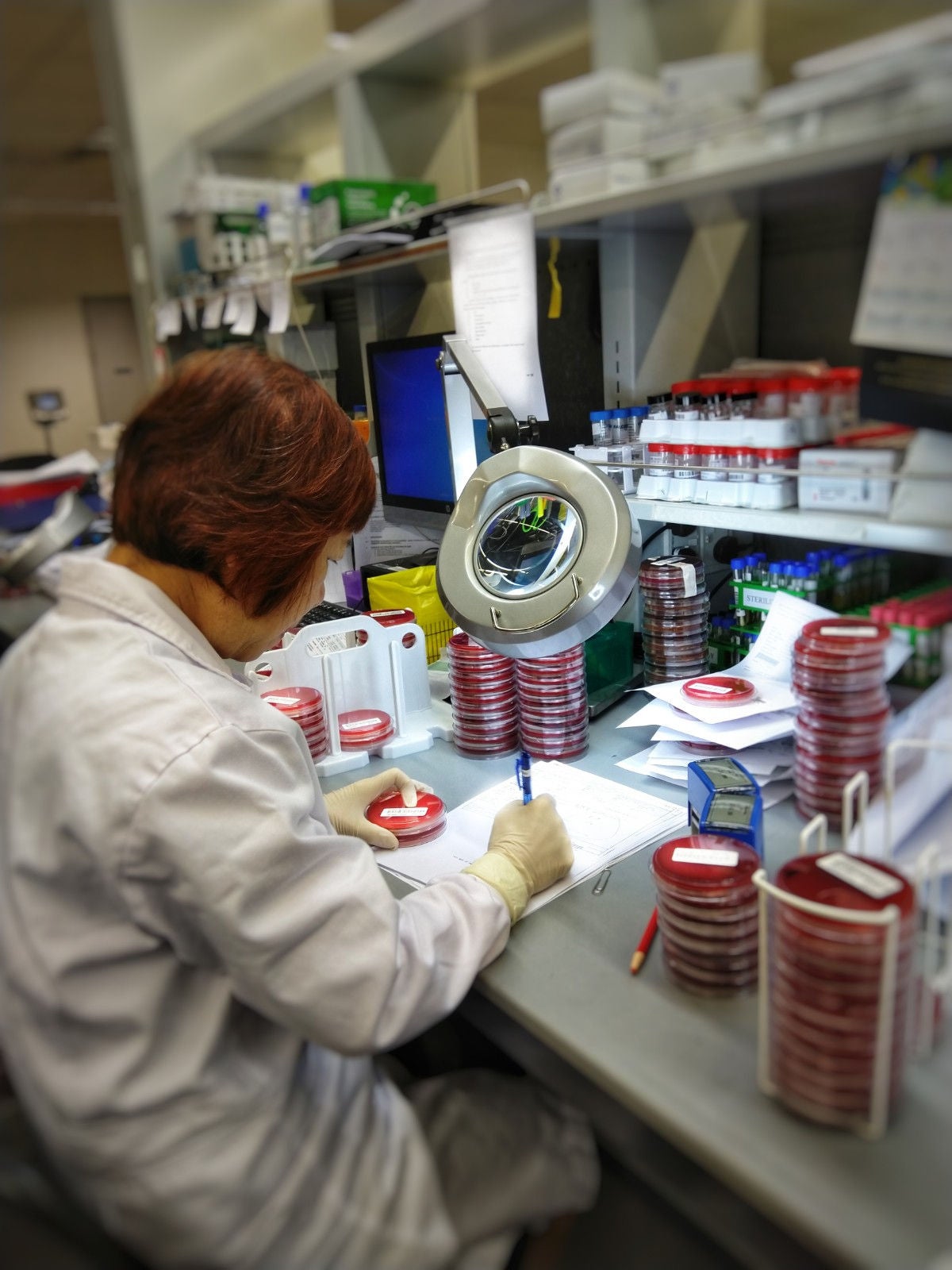
A senior staff in the microbiology lab examines the incubated plates with bacteria growth.
SGH microbiology laboratory goes 24/7 after constant testing of ideas to overcome various hurdles.
In April 2018, the SGH microbiology laboratory went 24/7, providing round-the-clock services that are crucial in helping with the diagnoses of infectious diseases. Senior Consultant Dr Tan Ai Ling shared that the Department of Microbiology had been thinking of the idea for a while. However, security was an issue at the old pathology building, being very far from the other buildings on campus and isolated. The lab operated until 8pm as after that the area would be totally dark, which meant there was a 12-hour gap from 8pm to 8am. When there were urgent cases to test and review, the technologist and microbiologist on call would be activated.
After moving into its new premises at Academia, they revisited the idea again. “We wanted to do it for our patients,” said Dr Tan. “When a bacterial infection is detected in the blood, ideally we want to pass the results to the clinicians quickly so they can confirm their diagnosis and modify or optimise their initial medical treatments.”
Dr James Sim, her fellow consultant, added that compared to the past, SGH sees more diverse and complex cases today, often with unusual organisms recovered. These are the situations which prompt reporting so that the patient’s condition can be better managed.
Manpower

A major hurdle to working round the clock was a larger manpower need. After several rounds of presentation to the Medical Board, the department was granted five more medical technologists. The team decided to recruit permanent night shift staff so the existing technologists will contribute mainly to the evening shift, and join in the night roster should the need arise. This arrangement will help to cushion the disruption to the current work-life balance, especially for those with young children.
The night service offers a selected number of tests, focusing on those urgent and important, e.g. blood cultures, or screening test for patients upon admission. The night crew can thus be trained within 6 months, versus the 2 years it will take to be trained in the full suite of microbiology tests.
The tricky art of rostering
The next big hurdle was creating a new roster. “There were so many versions of the roster that we lost track!” Dr Sim recounted. They sought advice from the Department of Clinical Pathology and also other hospitals in Singapore with 24/7 labs.
“A few senior people tackled planning the roster as they already had a very good relationship with all the staff,” said Lab Supervisor and Medical Lab Scientist Ferdaus Haneem Tahar. “They heavily engaged staff and took in their concerns about major changes in their work hours. Together with HR, we also held many engagement and feedback sessions with the staff before we introduced the new roster. We made sure staff understood why we were doing this, how it helped patients in the end and made sure the roster was flexible as well.
“Everyone comes into this job to help patients so once they understood the benefits to patients, they agreed to the changes. Staff were also encouraged to raise concerns with us and HR anytime.”
Mountains shrink

(From left) Lab Supervisor and Medical Lab Scientist Ferdaus Haneem Tahar, Senior Consultants Dr Tan Ai Ling and Dr James Sim
On the first night of 24/7 operations, Dr Sim came in to observe how many specimens came in and if the staff could cope. The health of the night crew is always a concern. He realised it was quite taxing and worried that staff would miss their break when they were overwhelmed with work. The result was a priority list which guided the night crew on which tests to do first.
“Every time I come in, I check that they have taken their break,” added Haneem.
Although regular staff have to do an occasional night shift, they are now quite happy that they are no longer greeted by mountains of specimens to process in the morning. As a result of going 24/7, workload is evened out throughout the day. There are fewer surges in work volume and it increases the efficiency of the laboratory. The average analysis time it takes for a blood culture to be confirmed positive is now almost a day faster.
Dr Tan and Haneem shared that the lab couldn’t have gone ahead with the change without strong support from all the staff working in the lab and help from so many other colleagues. “Besides HR, Finance and support from senior management, Facilities assured us they would swing by should anything break down in the middle of the night, e.g. aircon, lights or power. And our security colleagues also affirmed their support, especially for our night staff’s safety.”
Dr Tan and Dr Sim added that the department is always trying to become more efficient. “Once this work flow is settled, we will be looking at other things that we may want to change and improve. We will look at ways to improve patient care, bed utilization and infection prevention and control. Hopefully we can further improve our services through these improvement initiatives.”
Dr Tan Thuan Tong, Head of the Department of Infectious Diseases, expressed gratitude for the “enthusiastic microbiologists and lab technologists who work 24/7 to help our patients”, adding that they are “absolutely crucial to modern medical care, and every bit as important as clinicians looking after patients by the bedside.”
We love mail! Drop us a note at lighternotes@sgh.com.sg to tell us what you like or didn’t like about this story, and what you would like to see more of in LighterNotes.













 Get it on Google Play
Get it on Google Play